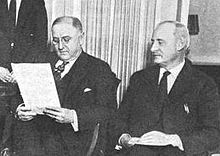James Alexander Fowler
James A. Fowler | |
|---|---|
 Fowler (right) with Attorney GeneralHarry M. Daughertyin 1922 | |
| Born | February 22, 1863 |
| Died | November 18, 1955(aged 92) |
| Resting place | Greenwood Cemetery Knoxville, Tennessee,USA |
| Education | East Tennessee Wesleyan University,LL.D.[1] |
| Political party | Republican[1] |
| Spouse | Lucy Hornsby[1] |
| Children | Harriet, Harley, Hornsby, James, Jr., Edward, Samuel[1] |
| Parent(s) | Joseph Fowler and Mary Conner[1] |
James Alexander Fowler(February 22, 1863 – November 18, 1955) was an American lawyer who served in various capacities as anAssistant Attorney Generaland special assistant to the U.S. Attorney General from 1908 to 1914, and from 1921 to 1926. In this role, he either argued or prepared briefs for several notableSupreme Courtcases, and was active in the organization of the short-livedCommerce Court.[1][2]Fowler was an unsuccessful candidate for Governor of Tennessee in 1898 as well as for U.S. Senator in 1928.[1]He served one term asmayorofKnoxville, Tennessee,from 1927 to 1929.[1]
Biography[edit]
Early life[edit]
Fowler was born at Bull Run Crossing in ruralKnox County, Tennessee,the son of Joseph and Mary Conner Fowler.[1]He attended the Holston Seminary inNew Market, Tennessee,and obtained his law degree from East Tennessee Wesleyan University (nowTennessee Wesleyan College) in 1884.[1]He then moved toClinton, Tennessee,and worked as principal ofClinton High Schoolfor about a year.[1]He was admitted to the bar in 1886, and commenced the practice of law inAnderson Countyand surrounding counties.[1]
Fowler received theRepublican Partynomination for governor in 1898.[1]Democratsdominated most statewide elections during this period, and Fowler was easily defeated in the general election, managing to garner just 39.8% of the vote.[3]
In 1899, Fowler formed a law partnership, Lucky, Sanford and Fowler, with C.E. Lucky and future Supreme Court justiceEdward Terry Sanford.[1]He moved to Knoxville two years later. In 1907, Fowler served as a special prosecutor during the high-profile trial of James Fulton, an attorney accused of killing fellow attorney andUniversity of Tennesseefootball standout, Sam Parker.[4]
Justice Department[edit]
Fowler was appointed U.S.Assistant Attorney Generalby PresidentTheodore Rooseveltin June 1908,[1]and was reappointed by PresidentWilliam Howard Taftthe following year.[1]In May 1911, he was appointed assistant to the attorney general (which marked a promotion) by Taft.[5]While the Taft Administration came to an end in March 1913 after his defeat in the presidential election of the previous year, Fowler was retained as a special assistant byWoodrow Wilson's first attorney general,James C. McReynolds.[1]Following McReynolds' nomination to the Supreme Court in August 1914, Fowler returned to private practice in Knoxville.[1]
As an assistant or special assistant to the attorney general, Fowler primarily handled the Justice Department's antitrust cases (which are now handled by the department's Antitrust Division).[6]In this role, he argued several cases before the Supreme Court. In 1913, he prepared the brief and delivered the argument forUnited States v. Chandler-Dunbar Water Power Company,a case involving water rights and compensation for property seized by the government.[1]His brief in this case was referenced throughout the 1936 landmark case,Ashwander v. Tennessee Valley Authority.[1]Fowler also argued several cases before the short-livedCommerce Court,and later published a paper in theNorth American Reviewdefending this court.[2]
In 1921, Fowler was appointed special assistant to the attorney general by Attorney GeneralHarry M. Daugherty.[7]Daugherty initially tasked Fowler with handling the federal government's cases arising from New York's Lockwood investigations, which involved acts of extortion committed by the leaders of building materials unions. He later handled several Supreme Court cases, includingFederal Trade Commission v. American Tobacco Co.(1924),[8]United States v. Ninety-Five Barrels Alleged Apple Cider Vinegar,[9]andUnited States v. General Electric Co.(1926).[10]
Later life[edit]
Fowler was elected to Knoxville's city council in 1927, and chosen as mayor by his fellow councilmen.[1]He was reelected in 1929, but did not serve as mayor during his second term.[1]Fowler received the Republican nomination for U.S. Senate in 1928, but was defeated in the general election byKenneth McKellar.[1]After his second city council term ended in 1931, he returned to private practice. He died on November 18, 1955, and was interred in Knoxville's Greenwood Cemetery.[1]
Fowler was a member of the University of Tennessee board of trustees, and was president of the board of trustees for hisalma mater,Tennessee Wesleyan College.[1]He was also active in numerous Methodist charities and organizations. His lawfirm, renamed Fowler and Fowler after his sons joined, continued operating in Knoxville under various partners for several years after his death,[1]and his descendants continued practicing law in the Knoxville area into the 21st century.[11]
See also[edit]
References[edit]
- ^abcdefghijklmnopqrstuvwxyzAlice Howell, Lucile Deaderick (ed.),Heart of the Valley: A History of Knoxville, Tennessee(Knoxville: East Tennessee Historical Society, 1976), pp. 523-524.
- ^abJames A. Fowler, "The Commerce Court,"The North American Review,Vol. 197, No. 4 (April 1913), pp. 464-476.
- ^Phillip Langsdon,Tennessee: A Political History(Franklin, Tenn.: Hillsboro Press, 2000), p. 232.
- ^Donald Paine, "The Trials of Lawyer James E. Fulton for Murdering Lawyer Sam Parker,"Tennessee Bar Journal,Vol. 39, No. 12 (December 2003). Retrieved: 6 October 2011.
- ^Register of the Office of the Attorney General,No. 2 of 1911, 18 December 1911, p. 5. Retrieved: 6 October 2011.
- ^History of the Antitrust Division.Retrieved: 6 October 2011.
- ^Concrete,Vol. 18, No. 6 (June 1921), p. 107.
- ^Federal Trade Commission v. American Tobacco Co.,Findlaw.com. Retrieved: 6 October 2011.
- ^United States v. Ninety-Five Barrels (More or Less) Alleged Apple Cider Vinegar,Cornell University School of Law database. Retrieved: 6 October 2011.
- ^United States v. General Electric Co.,Findlaw.com. Retrieved: 6 October 2011.
- ^Sam F. Fowler Jr., Member of Fowler Law Family, Dies at 82,"KnoxvilleNews Sentinel,6 May 2011. Retrieved: 6 October 2011.
External links[edit]
- James A. Fowler Papers– University of Tennessee Howard H. Baker Center for Public Policy
- The Commerce Court– a 1913 paper written by Fowler
